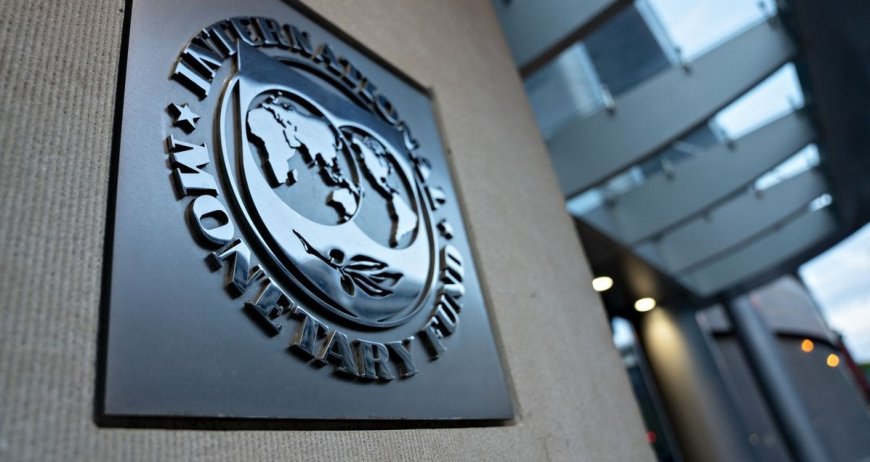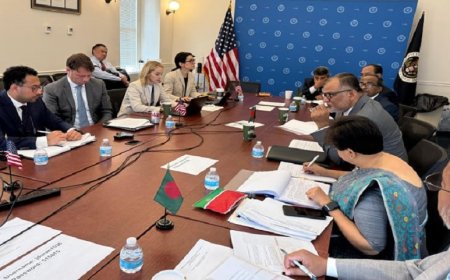IMF Board Approves $1.3 Billion Tranche from $4.7 Billion Loan Package for Bangladesh
Bangladesh’s macroeconomic pressures have intensified following the popular uprising in the summer of 2024.

IMF Approves $1.3 Billion Disbursement to Bangladesh as Part of $4.7 Billion Loan Program
The International Monetary Fund (IMF) has approved a disbursement of approximately $1.3 billion for Bangladesh, covering the third and fourth tranches under its ongoing $4.7 billion loan package.
In a press release issued today, the IMF announced that its Executive Board had completed the combined third and fourth reviews of Bangladesh's arrangements under the Extended Credit Facility (ECF), Extended Fund Facility (EFF), and the Resilience and Sustainability Facility (RSF). The Board also approved an augmentation of SDR 567.19 million (53.2% of quota) to the ECF/EFF programs, along with a six-month extension.
Following the completion of these reviews, Bangladesh will immediately receive SDR 650.5 million (approximately $884 million) under the ECF/EFF and SDR 333.3 million (around $453 million) under the RSF.
In addition, the IMF Executive Board approved adjustments to certain performance criteria and granted a waiver for Bangladesh’s temporary non-observance of the performance target concerning exchange restrictions, acknowledging the corrective measures that have been implemented.
Bangladesh’s original arrangements, approved on January 30, 2023, included SDR 2.5 billion (approximately $3.3 billion) under the ECF/EFF and SDR 1 billion (about $1.4 billion) under the RSF. With today’s augmentation, total assistance under the ECF/EFF now stands at SDR 3,035.65 million (roughly $4.1 billion), alongside the RSF arrangement of SDR 1 billion. The enhanced financing package aims to restore macroeconomic stability, promote inclusive growth, support vulnerable populations, and strengthen resilience to climate risks.
Since the political upheaval and popular uprising that unseated the previous government in the summer of 2024, Bangladesh’s macroeconomic challenges have intensified. While the formation of an interim government has stabilized the political and security landscape, ongoing political uncertainty, a tight policy environment, rising trade barriers, and growing stress in the banking sector have weighed on the economic outlook.
Despite these headwinds, program performance through the third and fourth reviews is assessed as broadly satisfactory. The Bangladeshi authorities remain committed to the program’s policy objectives and have recently advanced key reforms, including measures to increase exchange rate flexibility and boost tax revenues.
Following the Executive Board meeting, IMF Deputy Managing Director and Acting Chair Nigel Clarke stated:
“Bangladesh continues to face multiple macroeconomic challenges. Despite these difficulties, the authorities have kept program performance broadly on track and remain committed to the necessary reforms. The IMF-supported program is helping safeguard macroeconomic stability, protect the most vulnerable, and advance reforms to promote inclusive and resilient growth.
“In the near term, policy efforts should focus on rebuilding external buffers and reducing inflation. The authorities’ recent moves to adopt a more flexible exchange rate and introduce revenue-enhancing measures in the FY2026 budget are positive steps. A policy mix combining tight monetary policy, greater exchange rate flexibility, and revenue-based fiscal consolidation will be critical to restoring both external and internal balance.
“Increasing tax revenue and rationalizing spending—including through subsidy reductions—will help create fiscal space for social, development, and climate-related investments. Continued subsidy reform and improved public financial management are essential to enhancing spending efficiency and reducing fiscal risks.
“Safeguarding financial sector stability and addressing emerging vulnerabilities must remain a priority. An immediate task is to develop a comprehensive, phased strategy for banking sector reforms, supported by swift implementation of new legal frameworks that ensure orderly bank restructuring while protecting small depositors.
“Structural reforms remain crucial for Bangladesh’s ambition to achieve upper middle-income status. Priorities include diversifying exports, attracting higher foreign investment, strengthening governance, and improving data quality.
“Building resilience to natural disasters will be key to sustaining high and inclusive growth. The RSF’s focus on improving institutional capacity, policy coordination, and climate-related spending efficiency is critical to mobilizing additional climate finance.”
The IMF Staff Report detailing the findings of this review has been authorized for public release.
What's Your Reaction?





















































































